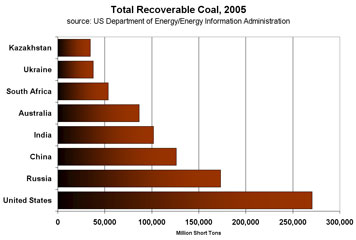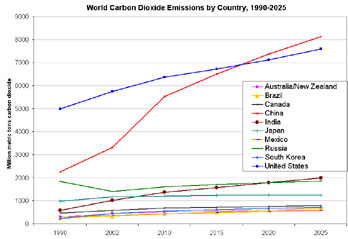Shell chairman calls for clean coal technologies to fight global warming
Shell chairman calls for clean coal technologies to fight global warming
Rhett A. Butler, mongabay.com
August 4, 2006
In a talk given last week at the prestigious Royal Society in Britain, the outgoing chairman of Shell Oil said that cleaner-burning coal technologies are urgently needed to minimize greenhouse gas emissions from the ongoing use of fossil fuels in coming decades.
Lord Ronald Oxburgh, non-executive chairman of Royal Dutch Shell PLC from 2004-2005, said that global climate change and the continued use of fossil fuels presents a huge challenge to mankind, which has developed civilization in an environment of “exceptionally stable” climate conditions over the past eight thousands years. He said that there is no simple answer to reigning in emissions of heat-trapping gases “because the developed world has an enormous infrastructure geared to the availability of cheap fuel and because world population and energy demand are growing rapidly.”
“We have to economise, be more efficient and move away from fossil fuels,” Lord Oxburgh remarked. “Renewable energy sources such as wind, wave and solar have a role to play, but will not really come into their own until we have a way of storing their energy. New enzyme technology makes agricultural by-products, such as straw, a cost-effective and low carbon dioxide source of vehicle fuels, opening the way to co-production of fuel and food. Urban waste is another largely untapped energy source.”
With rising fuel prices, firms and investors are pouring millions of dollars into developing renewable energy technologies. Bill Gates, the world’s richest man, has recently put $84 million in an American ethanol company, while global energy gluttons ranging from the United States to China are setting long-term targets for the switch to such fuels potentially offering a secure domestic source of renewable energy and fewer environmental headaches.
 Current coal reserves. Source: US Department of Energy/Energy Information Administration Cleaner, more efficient use of coal could play a key role in addressing climate change, especially with the growing importance of coal as an energy source as world crude oil supplies are diminished in the future. Coal presently supplies about two-thirds of China’s energy and one-third of the energy demand in the United States but, due to its abundance, is forecast to become an increasingly important relative to petroleum around mid-century. |
Despite this interest, Lord Oxburgh notes that fossil fuels, due to their abundance and ease-of-use, will continue to be burned as long as they are available. Coal, in particular, will be utilized as an energy source. In China, the use of coal for electricity generation has increased from 71 percent in 1990 to 79 percent in 2003, while in India, the amount has climbed from 65 percent to 68 percent over the same period. Overall, the share of electricity generated by coal in developing countries has shifted from 41 percent in 1990 to 46 percent in 2003, according to the World Bank.
“It is… inevitable that fossil fuels will be widely used for many decades, particularly coal in developing countries,” said Oxburgh. “No energy policy is complete that does not take account of this. It is urgent that techniques for burning coal cleanly be matured.”
“Time is pressing and we have to make a start on greenhouse gas control now with the technologies we have today new approaches will undoubtedly emerge and can be fed in as they develop over the next 25 years. Research developments in energy storage, carbon capture and efficient use of energy will be particularly important.”
RELATED ARTICLES
China and India show rapid increase in global warming emissions Greenhouse gases on the rise, China and India show rapid increase; Rich countries consume more than half the energy produced in the globe; Poor countries still depending on traditional fuels.
 Greenhouse gases hit record in 2005 Levels of gases believed to be fueling global warming continued to climb in 2005 according to analysis released by the U.S. National Oceanic and Atmospheric Administration (NOAA). The agency said its index of greenhouse gases — the Annual Greenhouse Gas Index or AGGI — showed an increase in carbon dioxide (CO2) and nitrous oxide but a leveling off of methane, and a decline in two chlorofluorocarbons (CFCs), gases that contribute to the hole in the ozone layer above Antarctica. NOAA reports that overall, the AGGI “shows a continuing, steady rise in the amount of heat-trapping gases in the atmosphere.” Greenhouse gas emissions will rise by 52% by 2030 warns EIA The International Energy Agency (EIA) today released a report projecting that global greenhouse gas emissions will rise by 52% by 2030, unless the world takes action to reduce energy consumption. Further, the IEA says that oil prices will rise “substantially” unless there is extra investment — $20.3 trillion in fresh facilities by 2030 — in oil facilities. |
Clean coal could fight climate change
A new chemical process for removing impurities from coal could lead to significant reductions in carbon dioxide emissions from coal-fired power stations say researchers sponsored by the Engineering and Physical Sciences Research Council, Britain’s main agency for funding research in engineering and the physical sciences.
Renewable energy in China, a strategic future?
China’s failed bid for American petroleum firm Unocal may prompt it to further focus on its development of alternative energy sources. While China has been actively investing in exploration and development operations in Africa, South America, and other parts of Asia over the past five years, China has also significantly expanded its interests in renewable energy sources including wind, solar, biofuels, tidal, and small hydroelectric dams.
US has low-cost alternatives to oil; peak oil frenzy and human-induced climate change avoidable
Surging oil prices have fueled calls for the United States to develop new sources of affordable and secure domestic energy. While renewable energy — especially biofuels, wind power, and solar technologies — is an area of particular interest, researchers from the Earth Institute at Columbia University say that the U.S. already has relatively low-cost alternatives to imported oil, including coal, tar sands, and oil shale. These resources can be extracted and used at a lower cost to the environment than some might expect.
Venture Capitalists, China and Green Technology
A Bay Area venture capitalist with a storied past, has set his sights on “green technology” and ultimately China, after some compelling remarks from state representatives at a recent conference. Early this spring, Chinese officials named solar and clean coal technologies as two of their three pre-eminent priorities for investment and development in the near future. For a country with burgeoning energy needs surpassing what power is presently available, this is both realistic and positive news for environmentalists and economists alike. Hoping to capitalize, John Doerr and his associates are now funneling cash into the emergent green technology sector, which he, and an increasing number of other investors believe to be the next big thing.
Green coal? Process converts coal into diesel fuel
As the United States’ oil reserves dwindle, some say the nation will have to rely on synthetic petroleum fuel made from its large stores of coal. A two-step chemical process augments a method of making cleaner-burning alternative fuel from coal and other carbon sources by transforming some of its waste products into diesel fuel, researchers from the University of North Carolina at Chapel Hill and Rutgers, the State University of New Jersey, report.
This article used quotes from a Royal Society news release and previous mongabay.com articles.